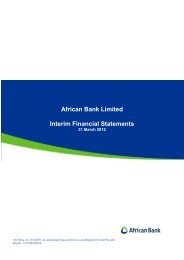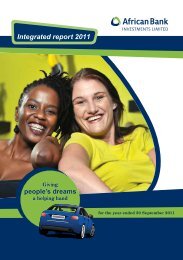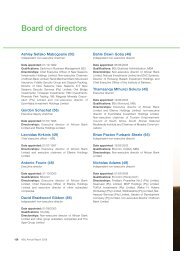Download - African Bank
Download - African Bank
Download - African Bank
You also want an ePaper? Increase the reach of your titles
YUMPU automatically turns print PDFs into web optimized ePapers that Google loves.
Management discussion continued<br />
Accounting policies<br />
and tax<br />
AC133 – Financial Instruments:<br />
Recognition and Measurement<br />
ABIL has incorporated AC133 into<br />
its final results for the 12 months<br />
ended 30 September 2003. It is a<br />
prospective statement, which does<br />
not require restatement of the<br />
comparative results.<br />
The statement deals primarily with the<br />
recognition and valuation of financial<br />
instruments (referred to as the fair value<br />
of certain assets and liabilities) as well as<br />
prescribing the accounting treatment for<br />
any hedges a company may hold against<br />
any of its assets and liabilities.<br />
The only area of potential major impact<br />
for ABIL is the recognition, measurement<br />
and valuation of the advances portfolio<br />
and related provisioning. This is an area<br />
where there is much debate around the<br />
interpretation of the statement, and as<br />
few banks have disclosed full results<br />
incorporating the impact of AC133, it is<br />
likely that such debate will continue for<br />
some time. ABIL has used the following<br />
principles for the adoption of the<br />
statement:<br />
All advances are measured at cost<br />
and accounted for on a cost<br />
amortisation basis (constant accrual of<br />
the yield to maturity on a time basis);<br />
AC133 prescribes that an impairment<br />
test be performed on all assets or<br />
portfolios of assets and, if positive,<br />
then an impairment provision be<br />
raised against the asset or portfolio.<br />
Such impairment provision will be<br />
based on an assessment of the<br />
present value of all future recoveries<br />
from the asset. In the case of<br />
ABIL, save for credit life, all loans are<br />
unsecured, and therefore this provision<br />
is based purely on the anticipated<br />
recoveries from the debtor;<br />
<strong>African</strong> <strong>Bank</strong> Investments Limited 34<br />
ABIL’s credit management process<br />
uses credit risk pricing in assessing<br />
the levels of interest rates for its<br />
various products, such that the<br />
inherent risk of default is covered by<br />
the risk premium charged on the<br />
loan. The accrual of interest<br />
including the credit risk premium will<br />
cover future credit losses as long as a<br />
loan portfolio is performing. As soon<br />
as a loan stops performing, that is<br />
cash is not being received, this no<br />
longer holds true and an impairment<br />
provision should be considered;<br />
It would follow therefore that all<br />
performing loans, assuming the<br />
credit risk premium still covers the<br />
inherent risk of default, would<br />
require no provision. The <strong>Bank</strong>s Act,<br />
however, requires that minimum<br />
provisions be held for all loans. The<br />
total amount of this “general” or<br />
portfolio provision of R30,1 million<br />
has been maintained in order to<br />
comply with the <strong>Bank</strong>s Act, but has<br />
been separately disclosed;<br />
For loans that are non-performing,<br />
the specific provisions, based on<br />
portfolio groups, default<br />
characteristics and recovery<br />
prospects, reflect the difference<br />
between the present value of<br />
expected future recoveries on these<br />
loans and the gross outstanding<br />
balance. This approach is largely<br />
consistent with the previous methods<br />
used by ABIL and consequently there<br />
has been no material change in the<br />
provisions as a direct result of the<br />
statement. Any small differences<br />
have been included in the income<br />
statement charge for movements in<br />
provisions;<br />
The group does not have any<br />
hedges or other assets that are<br />
materially affected by the rules<br />
regarding recognition and valuation<br />
of these instruments.<br />
Accounting policies<br />
The accounting policies adopted for<br />
purposes of this report comply with<br />
South <strong>African</strong> Statements of Generally<br />
Accepted Accounting Practice as well as<br />
with applicable legislation. They are<br />
consistent with the prior period, with the<br />
exception of the adoption of AC133.<br />
Secondary tax on companies<br />
(STC)<br />
Dividends paid by the ABIL Group<br />
attract the full 12,5% STC charge as the<br />
group does not earn any STC credits in<br />
the ordinary course of its business.<br />
AC501 states that the STC charge paid<br />
on dividends must be disclosed in the<br />
income statement as a tax charge and in<br />
addition it also states that the charge<br />
must be accrued in the year that the<br />
dividend is accounted for. Since GAAP<br />
requires dividends to only be accounted<br />
for in the year that they are declared (as<br />
opposed to the period to which they<br />
relate) there will always be a mismatch of<br />
the STC, that is it will reflect in the results<br />
for the period after the year in which the<br />
profits were made and on which the<br />
dividend is declared.<br />
ABIL believes that a dividend and<br />
associated STC charges are capital<br />
transactions and should not impact<br />
operating results. This is especially true<br />
for the special dividend which will accrue<br />
a tax charge of R60 million in the first half<br />
of 2004 in addition to the STC charge on<br />
normal dividends. It is likely, however, that<br />
ABIL will have to account for this as a tax<br />
charge in the income statement for 2004.







